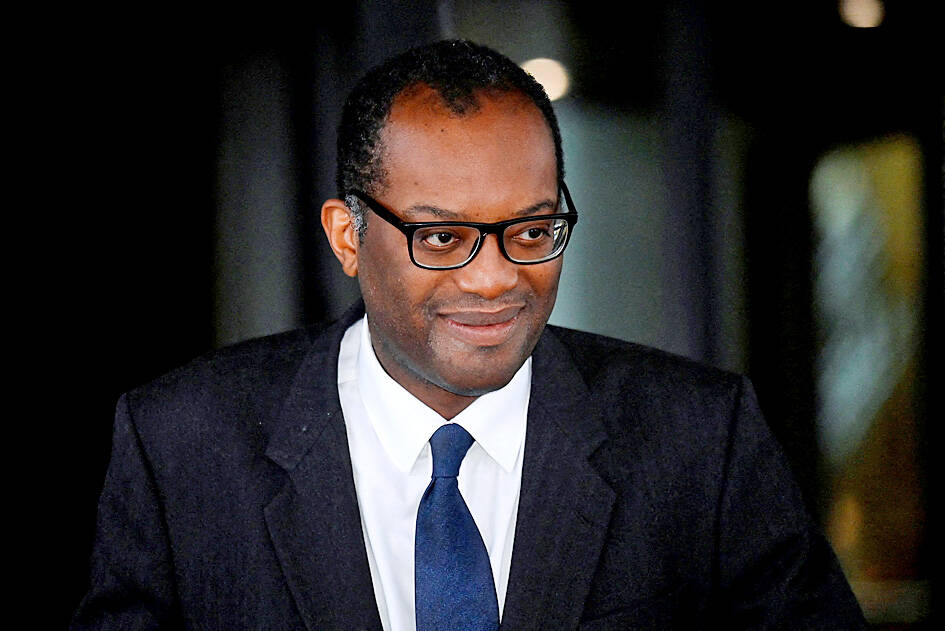The Bank of England (BOE) yesterday acted again to stem a sharp sell-off in Britain’s £2.1 trillion (US$2.31 trillion) government bond market by announcing the purchase of inflation-linked debt until the end of this week.
Citing a “material risk” to financial stability arising from a rout in British government bonds — known as gilts — the central bank said that it would buy up to £5 billion of index-linked debt per day, starting yesterday.
Rather than increase the existing commitment to buy up to £10 billion of gilts each day, as announced on Monday, the purchases would run alongside existing purchases of long-dated conventional bonds, now worth up to £5 billion.

Photo: Reuters
The move and the increased warnings from the central bank came after British Prime Minister Liz Truss last month announced an economic agenda that was followed by a collapse in international investor confidence toward British assets.
There was a massive sell-off on Monday of British inflation-linked gilts — known as linkers — despite the bank doubling the maximum size of its buy-backs of conventional long-dated gilts.
“The beginning of this week has seen a further significant repricing of UK government debt, particularly index-linked gilts,” the bank said in a statement.
“Dysfunction in this market and the prospect of self-reinforcing ‘fire sale’ dynamics pose a material risk to UK financial stability,” it added.
Investors in British government debt are worried about what will happen to the market after most of the Bank of England’s emergency support measures end on Friday.
Index-linked gilts are typically held by pension funds, which have been scrambling to raise cash after British Chancellor of the Exchequer Kwasi Kwarteng last month sparked a bond rout with plans for unfunded tax cuts.
Pension funds were forced to stump up emergency collateral in liability-driven investments, which use derivatives to safeguard against shortfalls in pension pots, after British government bond yields rocketed.
To halt freefalling prices, the central bank pledged to buy as much as £65 billion of long-dated gilts.
Yesterday’s announcement came a few hours before the British Debt Management Office was to attempt to sell £900 million of a linker due in 2051 into the market.

Intel Corp chief executive officer Lip-Bu Tan (陳立武) is expected to meet with Taiwanese suppliers next month in conjunction with the opening of the Computex Taipei trade show, supply chain sources said on Monday. The visit, the first for Tan to Taiwan since assuming his new post last month, would be aimed at enhancing Intel’s ties with suppliers in Taiwan as he attempts to help turn around the struggling US chipmaker, the sources said. Tan is to hold a banquet to celebrate Intel’s 40-year presence in Taiwan before Computex opens on May 20 and invite dozens of Taiwanese suppliers to exchange views

Application-specific integrated circuit designer Faraday Technology Corp (智原) yesterday said that although revenue this quarter would decline 30 percent from last quarter, it retained its full-year forecast of revenue growth of 100 percent. The company attributed the quarterly drop to a slowdown in customers’ production of chips using Faraday’s advanced packaging technology. The company is still confident about its revenue growth this year, given its strong “design-win” — or the projects it won to help customers design their chips, Faraday president Steve Wang (王國雍) told an online earnings conference. “The design-win this year is better than we expected. We believe we will win

Chizuko Kimura has become the first female sushi chef in the world to win a Michelin star, fulfilling a promise she made to her dying husband to continue his legacy. The 54-year-old Japanese chef regained the Michelin star her late husband, Shunei Kimura, won three years ago for their Sushi Shunei restaurant in Paris. For Shunei Kimura, the star was a dream come true. However, the joy was short-lived. He died from cancer just three months later in June 2022. He was 65. The following year, the restaurant in the heart of Montmartre lost its star rating. Chizuko Kimura insisted that the new star is still down

While China’s leaders use their economic and political might to fight US President Donald Trump’s trade war “to the end,” its army of social media soldiers are embarking on a more humorous campaign online. Trump’s tariff blitz has seen Washington and Beijing impose eye-watering duties on imports from the other, fanning a standoff between the economic superpowers that has sparked global recession fears and sent markets into a tailspin. Trump says his policy is a response to years of being “ripped off” by other countries and aims to bring manufacturing to the US, forcing companies to employ US workers. However, China’s online warriors